We've been having a lovely time by the sea.
Food's been good. Hotel's been excellent - the Imperial- nice double room facing the sea. Weather's been variable though.
And we've seen three operas.
Yes, David and Ross do sand, sea, sex
and operas. Sounds like business as usual really.
![]()
Actually, it's nearly four years since we last went on holiday together. So, in some respects, this was a bit of a trial to see if we could still get on with each other at close quarters. Mostly we did.
Some quick snapshots before I discourse about the operas.
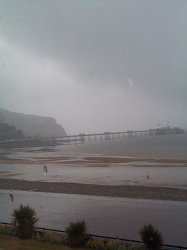 Brilliant thunderstorm on the Tuesday night. We made our way to the theatre
through it. I did wonder about holding an umbrella up into the sky whilst pushing
a wheelchair as the lightning flashed about us. There was a lightning storm in
Sitges too. We shagged during that one I seem to remember.
Brilliant thunderstorm on the Tuesday night. We made our way to the theatre
through it. I did wonder about holding an umbrella up into the sky whilst pushing
a wheelchair as the lightning flashed about us. There was a lightning storm in
Sitges too. We shagged during that one I seem to remember.
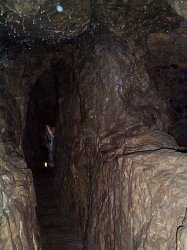
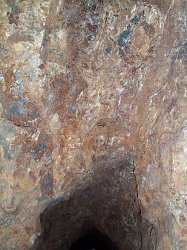 We visited the Great Orme. Since I was last there during a dirty weekend in the
80s, they've found some Bronze Age copper mines near the summit. We were both
intrigued and amazed by the set up. Only the underground passages were not
wheelchair accessible. See their
Web site to find out more.
We visited the Great Orme. Since I was last there during a dirty weekend in the
80s, they've found some Bronze Age copper mines near the summit. We were both
intrigued and amazed by the set up. Only the underground passages were not
wheelchair accessible. See their
Web site to find out more.
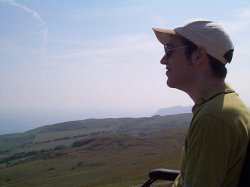
Whilst we were up the Orme, there was another wheelchair incident. BTW - we got up there in a car. Even I'm not so stupid as to push Ross up to the top of a rugged headland in his wheelchair. Anyhow, we were trailing round one of the many paths up there at the summit when one of the small front wheels of the chair hit a pebble and the whole thing lurched to the left and I jarred my left wrist and sprained a tendon. So I've got this bionic wrist guard to protect it.
Eating sandwiches on the prom. Seagulls divebombing. Trying to steal scraps.
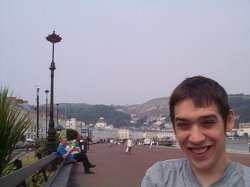
Swimming in the hotel's pool. Lazily. During the afternoon and first thing in the morning. Whilst Ross sleeps.
6:30am. Walking the beach. Sun well up already. Not alone. Tide well out. I played here as a child.
Rainstorm. Shelter in a shopping arcade. Circle of seats. Each occupied by a glum-faced old lady all clutching handbags in their laps. They looked like Norns spinning the fate of the world.
Wimbledon moved inexorably towards its finals. Eventually all the cuties went out. The names to watch out for next year are Marat Safin and Roger Federer.


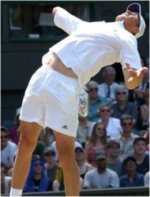


Yum, yum, to both.
Now to the opera. Welsh National Opera to be precise.
As I write these pieces of journalism, I'm stuck more and more by the potential for patterning in my life. Take this.
In the summer of 1979, as I was getting over the effects of a nervous breakdown the year before, I went on an opera holiday to Llandudno. I stayed in the Hydra Hotel and went to the operas in a converted cinema called The Astra. Wimbledon was on. I saw The Turn of the Screw. Last year, I came to Llandudno and saw a new production of the same work. In 1979, I also saw Turandot. Earlier this year, Ross and I heard Jane Eaglen sing this rôle. In 1979, I heard Rita Hunter. She died earlier this year.
My final opera in 1979 was The Magic Flute. It was a new production then. I saw the same production again this year.
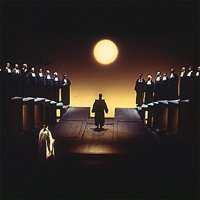
The first thing to say is that it is still a very good and tidy production. I was impressed that it clearly underlined the serious Age of Reason stance of the work well before later celebrated productions - Jonathan Miller's for Scottish Opera, Nicholas Hytner's for English National Opera.
The parade of animals was quite wonderful with exquisite life sized puppets.
You can tell that I'm putting off talking about the music. Well the orchestra under Anthony Negus performed well. And the chorus was pleasant and precise. The cast were... Well, they were alright. But not much more. Mostly younger voices not yet properly worked into their rôles. The best of the singing came from the Three Ladies. Christopher Purves was acclaimed as Papageno but then it's a difficult rôle to mess up. Natalie Christie was a pleasant Pamina; Peter Wedd a little underpowered as Tamino - but he moved well which is always an asset in a singer. The rest were really no more than sketching in their parts.
Beta-Plus for effort... but no more.
The following morning, at breakfast in the hotel, we were joined by the three boys and their understudy. Ethereal youths wearing Bermuda baggies and tank tops and munching cornflakes. You don't see that every day.
Tosca was a very different kettle of fish.
I can't remember the last time I was so gripped by this work in live performance. It's usually a good sing and a good wallow in swathes of orchestral sound. It is rarely totally up to the mark as a piece of affecting theatre. This performance was all of that. The psychological torture of Act Two has rarely been so gripping. The dénouement has rarely been so affecting. I actually felt tears in the eyes. For once, I believed that Tosca felt that she and her lover were going to escape and that she was watching a mock rather than a real execution.
Stephen O'Mara took Caravadossi at full pelt and full volume most of the evening. It wasn't subtle but then neither is the character. He starts Act I with a few political and amorous platitudes. He ends Act III with a few more of both. He doesn't really move very far. Then he gets shot.
Tosca is a different matter. Since Callas, the received wisdom has been to play the character as a forceful virago. If you want subtlety, you add a shade of termagant. It is not very satisfactory. The woman is an opera singer. You actually hear here sing part of a cantata off stage. The cantata is light, feathery and ornate. Most singers who attempt the Callas mould cannot sing the cantata. The character is also deeply religious and deeply unsure of herself. Get those things right and you have the well springs of the action. Miranda van Kralingen gave us all of that and much more. It was a poised and focussed performance from beginning to end. And she looked every bit the glamorous diva.
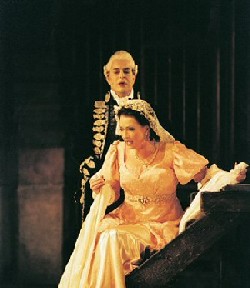 The trio of protagonists was completed by Peter Sidhom's Scarpia. What a
peformance? A little dry of tone at times but, again, it was all superbly
thought through and believable. This was a man who simply knew that he had
absolute power. Every gesture and facial expression told you that he didn't
expect anything other than complete submission and/or obedience from all
around him. And the man was a sexual sadist, enjoying Tosca's torment. And
enjoying also all the pleasures of the flesh with good wine and good food.
A lower noble rising above his station by dint of his good works and given
therefore as much room as he needed to satisfy his gourmet tastes. He went to
his death with absolutely no knowledge that the knife was about to be wielded.
The trio of protagonists was completed by Peter Sidhom's Scarpia. What a
peformance? A little dry of tone at times but, again, it was all superbly
thought through and believable. This was a man who simply knew that he had
absolute power. Every gesture and facial expression told you that he didn't
expect anything other than complete submission and/or obedience from all
around him. And the man was a sexual sadist, enjoying Tosca's torment. And
enjoying also all the pleasures of the flesh with good wine and good food.
A lower noble rising above his station by dint of his good works and given
therefore as much room as he needed to satisfy his gourmet tastes. He went to
his death with absolutely no knowledge that the knife was about to be wielded.
The production was a model of good sense. Apart from a somewhat anachronistic portrait in Act I, it was straight down the line in period. And played with an understanding of the historical period.
Under-rated hero of the evening was conductor Julian Smith whose knowledge of this genre of music is peerless. He supported the singers with a well paced and well articulated cushion of sound whilst allowing the inner voices of the orchestra to sing out as and when the drama needed.
Definitely an Alpha to Alpha-Plus evening.
The following morning the boys from The Magic Flute were back at the breakfast table. They were joined by the boys from the cathedral choir in Tosca. More remarkable was Baron Scarpia in a Hawaiian shirt and knee-length khaki shorts. You don't see that every day either.
We topped the week off with Janacek's Katy'a Kabanova.

I know that it's the current fashion to perform as many works as possible in their original language but I really don't see the point with the Slav languages. The argument is to do with the sound of what you hear being the sound that the composer intended and so it has been with the Royal Opera, Opera North and now Welsh National Opera.
But you have a cast learning the libretto phonetically and singing in a language that is far from their own native understanding to an audience that hasn't a clue what they are singing about. And this with a work that is rooted in a specific social setting.
I've also quibbles about the director's notion of the piece. Updating to the 1950s did not help the drama at all. In fact, it completely undermined the rôle of the mother-in-law, the Kabanicha. I also don't see Katya going mad at the end. I've always seen her as an intelligent woman driven to her wits end by the stifling boredom and conformity of the social circumstance she's been forced into. Those who can, like Kudryash and Varvara, escape. Katya knows only too well that she can't and that death, therefore, is the only other sane option.
That said the cast and orchestra did everything that was asked of them. I think they sang and played what was required. I just wasn't as engaged as I have been with previous rougher, Anglicised productions.
I think it was Alpha-Minus.
Ross and I have had a good run at operas this week.